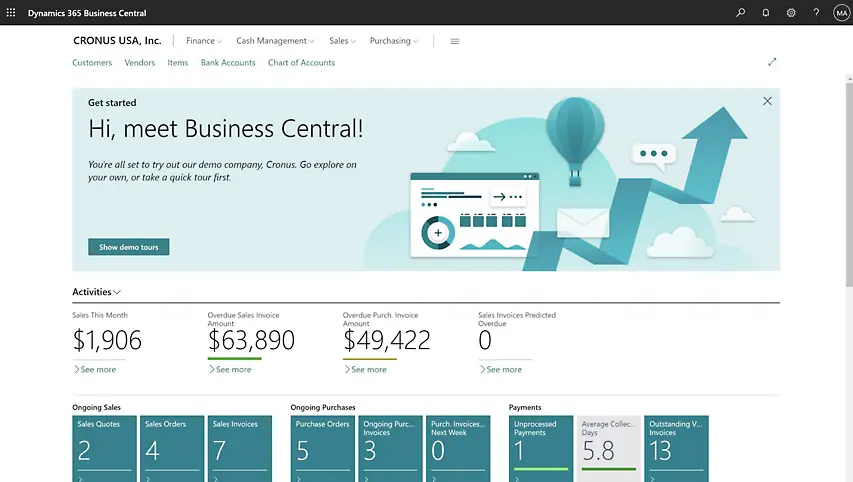The Ultimate Beginner’s Guide to Microsoft Dynamics 365 Business Central
In today’s fast-paced business environment, having the right tools can mean the difference between thriving and merely surviving. One such powerful tool is Microsoft Dynamics 365 Business Central. If you’re new to this platform, don’t worry – this guide will walk you through everything you need to know in an engaging and easy-to-understand manner.
What is Microsoft Dynamics 365 Business Central?
Microsoft Dynamics 365 Business Central is a comprehensive business management solution designed for small to medium-sized businesses. It automates and streamlines business processes, helping you manage your finances, sales, service, and operations. Think of it as a one-stop-shop for all your business needs.
Why Microsoft Dynamics 365 Business Central?
Key Features
- Financial Management: Streamline your accounting and financial operations. Keep track of financial transactions, manage cash flow, and generate detailed reports.
- General Ledger
- Accounts Payable/Receivable
- Bank Reconciliation
- Fixed Assets
- Sales & Marketing: Manage customer interactions, sales orders, and marketing campaigns all from one place.
- Opportunity Management
- Sales Invoicing
- Service Contracts
- Customer Insights
- Project Management: Track project timelines, manage resources, and monitor budgets.
- Project Planning
- Resource Management
- Job Costing
- Time Sheets
- Supply Chain Management: Improve your supply chain operations, manage inventory levels, and forecast demand.
- Inventory Management
- Purchase Order Management
- Warehouse Management
- Inventory Forecasting
- Human Resource Management: Manage employee information, track performance, and streamline HR processes.
- Business Intelligence: Get real-time insights and analytics to make data-driven decisions.
Pricing
The costs for Microsoft Dynamics 365 Business Central depend on the functionalities and user licenses you opt for. Typically, there are two main pricing tiers:
- Essential License: Offers core functionalities such as financial management, supply chain management, and human resource management.
- Premium License: Includes everything in the Essential License plus additional functionalities like manufacturing and service management.
Benefits of Using Business Central
All-in-One Solution
No need to juggle multiple systems. Business Central consolidates your data, operations, and processes into one streamlined platform. Whether it’s accounting, inventory, sales, or customer service, everything is right at your fingertips.
Cloud-Based Convenience
Forget the complexities of managing on-premises software. Being cloud-based means that you can access Business Central from anywhere, anytime. Plus, regular updates ensure that you’re always working with the latest tools and features.
Scalability
Is your business growing? Great! Business Central grows with you. As you expand, the software can be easily adapted to meet your increasing needs.
Dynamics 365 Implementation
Implementing Microsoft Dynamics 365 Business Central involves a few key steps:
- Planning: Define your business objectives and requirements.
- Customization: Configure the system to meet your specific needs.
- Data Migration: Import your existing data into the new system.
- Testing: Conduct thorough testing to ensure everything works as expected.
- Training: Train your team to use the new system effectively.
- Go-Live: Start using the system in your day-to-day operations.
- Support: Continuous support to address any issues that arise.
Business Central Integrations
One of the strengths of Dynamics 365 Business Central is its ability to integrate with other Microsoft products and third-party applications. Some popular integrations include:
- Microsoft Office 365: Seamless integration with Excel, Word, and Outlook.
- Power BI: Advanced data analytics and visualization tools.
- PowerApps: Custom app development without heavy coding.
- Third-Party Apps: Integration with various third-party tools through APIs.
ERP Systems for Small Businesses
Small businesses often struggle with managing various business processes on different platforms. An ERP (Enterprise Resource Planning) system like Microsoft Dynamics 365 Business Central consolidates everything into one system, providing numerous benefits such as:
- Improved efficiency
- Better data accuracy
- Streamlined operations
- Reduced operational costs
Implementation Process
Implementing Dynamics 365 Business Central might sound intimidating, but here’s a simplified step-by-step process to give you an idea:
- Needs Assessment: Identify your business requirements.
- Customization: Adjust the software to meet your needs.
- Data Migration: Move your existing data into Business Central.
- Training: Educate your staff on how to use the new system.
- Go Live: Launch the system and provide ongoing support.
Microsoft Dynamics Advantages
- User-Friendly: An intuitive interface that’s easy to navigate.
- Scalability: Grows with your business needs.
- Customization: Highly customizable to suit specific business requirements.
- Support & Community: Extensive support and a large user community.
Business Central vs SAP
When comparing Microsoft Dynamics 365 Business Central to SAP, several key differences emerge:
| Feature | Microsoft Dynamics 365 Business Central | SAP Business One |
|---|---|---|
| User-Friendliness | Very intuitive | Moderate |
| Pricing | More flexible | Generally higher |
| Customization | Highly customizable | Limited customization options |
| Integration with Microsoft | Seamless | Limited |
| Target Market | SMBs to Mid-sized Companies | Mostly SMBs |
Dynamics 365 Business Central Tutorial
Getting started with Microsoft Dynamics 365 Business Central is straightforward. Microsoft offers comprehensive tutorials and documentation to help you:
- Understanding the Basics: Learn the fundamental features and functionalities.
- Setup & Configuration: Guided steps to set up the system.
- Using the System: Tutorials on day-to-day operations.
- Advanced Features: Explore more advanced capabilities.
Conclusion
Microsoft Dynamics 365 Business Central is more than just a business management tool; it’s a robust platform designed to streamline and optimize your business processes. Whether you’re a small business owner or a growing enterprise, Business Central offers the flexibility, scalability, and integration you need to succeed.
Frequently Asked Questions (FAQs)
Q1: What is Microsoft Dynamics 365 Business Central?
A: Microsoft Dynamics 365 Business Central is a comprehensive business management solution designed to help businesses manage their financials, sales, service, and operations.
Q2: How much does Dynamics 365 Business Central cost?
A: Pricing varies based on the chosen license – Essential or Premium – and the number of users. It’s best to consult with a Microsoft partner for exact pricing.
Q3: What are the main features of Dynamics 365 Business Central?
A: Key features include financial management, sales & marketing, project management, supply chain management, HR, and business intelligence.
Q4: How can Dynamics 365 Business Central benefit my business?
A: It can streamline operations, improve data accuracy, enhance efficiency, and reduce costs.
Q5: Is Dynamics 365 Business Central suitable for small businesses?
A: Yes, it is specifically designed to cater to the needs of small to medium-sized businesses.
Q6: What industries can use Dynamics 365 Business Central?
A: Various industries such as retail, manufacturing, finance, healthcare, and more.
Q7: How to implement Microsoft Dynamics 365 Business Central?
A: Implementation involves planning, customization, data migration, testing, training, go-live, and ongoing support.
Q8: What are the integration options for Dynamics 365 Business Central?
A: It integrates seamlessly with Microsoft Office 365, Power BI, PowerApps, and numerous third-party apps.
Q9: What is the difference between Microsoft Dynamics 365 Business Central and SAP?
A: Dynamics 365 offers more user-friendliness, flexible pricing, and better integration with Microsoft products, whereas SAP might have limitations in customization and higher costs.
Q10: Can Dynamics 365 Business Central be customized?
A: Yes, it is highly customizable to fit specific business requirements.
#MSFTAdvocate #AbhishekDhoriya #LearnWithAbhishekDhoriya #DynamixAcademy
References & Read More:
- Unveiling Microsoft Copilot for Sales in Outlook: Your Ultimate Guide to Boosting Sales Productivity 2024
- Boost Your Sales Game with Microsoft Copilot for Sales in Teams: A Comprehensive Guide for Beginners 2024
- A Comprehensive Guide 2024 for Beginner to UTCNow And FormatDateTime in Power Automate
- Mastering Microsoft Dataverse Accelerator Installation: A Comprehensive Guide for Beginners 2024
- Unveiling the Power of Authoring Notes Before Saving Forms in Dynamics 365
- Understanding Transparency and Control in Consumer Data Use: A Beginner’s Guide



1 thought on “The Ultimate Beginner’s Guide to Microsoft Dynamics 365 Business Central”